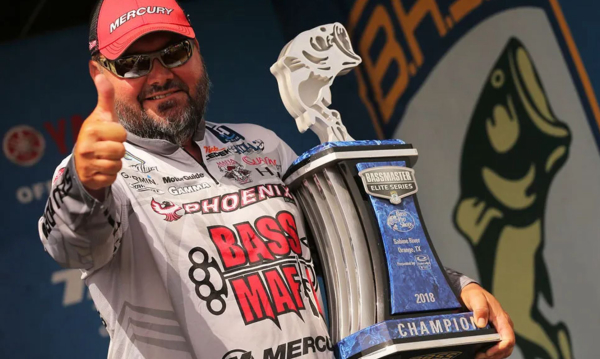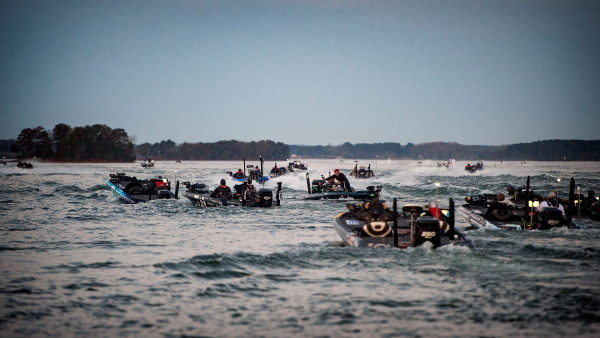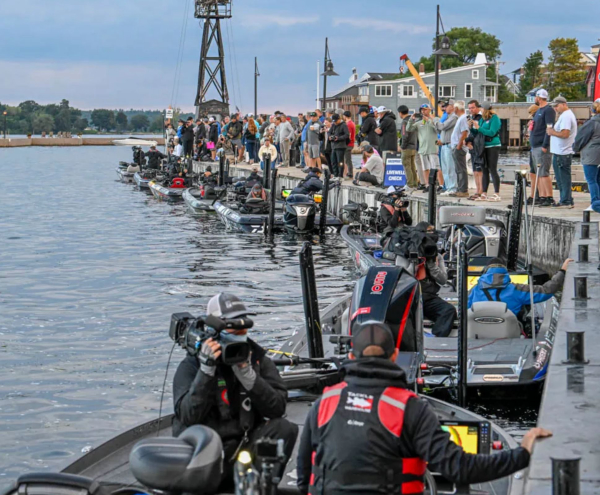
Bass Anglers Sportsman Society (B.A.S.S.) has announced they will eliminate entry fees for the 2025 Elite Series, generating a whole lot of buzz within the professional fishing community.
BASS reportedly will kick in an extra $4.1 million to cover the loss of entry fees. All anglers in the top 40 will get checks, though in the lower finishers, the pay will be minimal. Winner of each tournament will get $100,000 as in the past. The AOY gets 100K, the Classic Winner still gets $300,000.
If it works long term, the new system could reshape the landscape of competitive bass fishing, providing financial relief to the pro anglers who compete in this circuit. The removal of entry fees could redefine the financial viability of a professional fishing career for a lot more anglers.
Understanding the Financial Strain of Entry Fees
Historically, anglers competing in the B.A.S.S. Elite Series have faced entry fees of approximately $43,000 per season. This figure breaks down to about $5,000 per tournament, with a typical season comprising eight or nine events. For many pros, this upfront cost was a significant barrier, often requiring them to secure sponsorship deals, loans, or dip into personal savings just to participate.
Some anglers even fished on credit cards, building enormous debt following their dreams.
Basically, it was pay-to-play gambling on your skills, and while a few win big, most lose—a lot. Add the travel costs and maintaining a competitive bassing rig and truck that will total well over $100,000 in initial price and the traditional system eliminates a lot of good, competitive anglers just because they can’t afford it, or won’t risk it.
The elimination of these fees means that anglers will no longer have to worry about this substantial financial outlay at the beginning of each season. This change not only alleviates financial pressure but also opens up opportunities for anglers who may have been deterred from joining the Elite Series due to the high costs.
Boosting Take-Home Earnings for Anglers
One of the most immediate benefits of eliminating entry fees is the increase in take-home earnings for pro anglers. In a typical season, prize money for the Elite Series has ranged from $10,000 for lower finishes to over $100,000 for winning a tournament. However, after deducting the $43,000 in entry fees, even successful anglers would see their net earnings significantly reduced, and most wind up in the hole unless they have sponsors helping with the costs.
Try explaining that to your wife and family over a couple of years.
With entry fees eliminated, every dollar earned in tournament winnings will go straight to the angler’s pocket. For example, an angler who finishes in the top 10 multiple times in a season could easily earn between $50,000 and $100,000 in prize money. Without entry fees, this income remains intact, providing a more sustainable financial model for professional anglers despite the continuing costs of travel across the eastern half of the nation.

Reducing Overall Operating Expenses
Aside from entry fees, pro anglers face a variety of other expenses, including travel, lodging, fuel, and equipment maintenance. On average, an angler might spend around $30,000 to $40,000 annually on these additional costs. When combined with the previously mandatory $43,000 entry fees, the total expense for a season could reach upwards of $80,000 or more—really an unimaginable investment for most of us in something that’s highly likely to return zip.
With the elimination of entry fees, the overall financial burden is reduced by more than 50%, allowing anglers to allocate more of their budget toward improving their bottom line.
Enhancing Sponsorship Opportunities—or Not?
Sponsorship plays a crucial role in the livelihood of professional anglers. With the elimination of entry fees, anglers may find it easier to attract and retain sponsors.
Sponsors might view this change favorably, as it means their sponsored anglers will have more financial stability and potentially stay in the sport to build their reputation and with it their value in promotions.
On the other hand, sponsors may decide that since the anglers are paying less to play, they can be paid less to act as company billboards and spokesmen—time will tell.

Attracting New Talent to the Elite Series
The removal of entry fees could also serve as a catalyst for attracting new talent to the Elite Series. For years, the high cost of entry has been a barrier for many up-and-coming anglers who might have the skills but lack the financial backing.
This influx of new talent could elevate the level of competition, making the series more exciting for fans and sponsors alike. And of course it may draw some well-known names back from the MLF where so many went when that organization offered no-entry fishing—but now has had to go back to the more traditional pay-to-play format to remain viable.
By reducing the financial barriers to entry, B.A.S.S. is positioning itself as committed to supporting its competitors. This could foster greater loyalty among anglers, who may prioritize competing in the Elite Series over other circuits.
As the 2025 season approaches, all eyes will be on the B.A.S.S. Elite Series to see how this decision impacts the competition. One thing seems certain: the elimination of entry fees is a positive step toward making professional bass fishing a more accessible and financially viable career, at least for those few who are invited to join the Elite Series.
— Frank Sargeant
Frankmako1@gmail.com